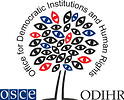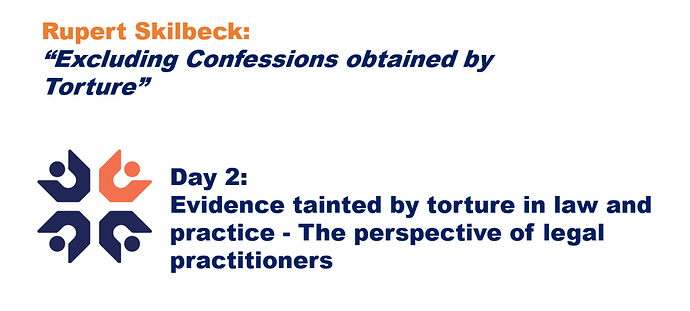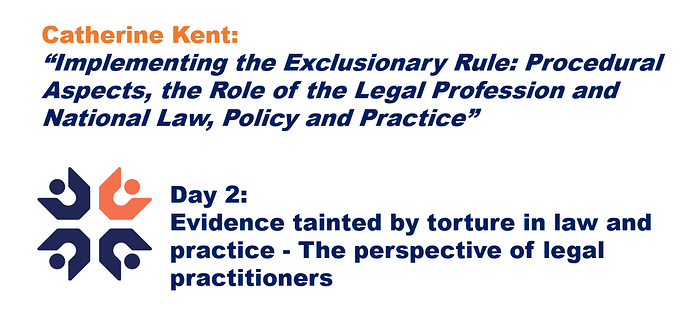The exclusionary rule is clearly enshrined in international law, standards and norms (see, e.g., Article 15, UN Convention against Torture (UNCAT); Report of the Special Rapporteur on torture, Juan E. Méndez (April 2014) [17, 22]). Despite this, a gap in national implementation remains and routine reliance on torture-tainted evidence persists, including in countries with an express exclusionary regime (REDRESS and Fair Trials. Tainted by Torture: Examining the Use of Torture Evidence (2018) pgs. 8, 37-38). This blog post outlines procedural aspects of domestic implementation in law, policy and practice in the context of judicial proceedings and highlights the role of the legal profession in upholding the exclusionary rule to prevent the admissibility of torture-tainted evidence.
Domestic frameworks
Many countries’ legislative frameworks contain normative provisions regarding the exclusionary rule (see, e.g., APT and CTI. Guide on anti-torture legislation (2016) pg. 28). However, international human rights law permits States discretion regarding the specific nature of exclusionary procedures (Fair Trials and OSCE ODIHR. Eliminating incentives for torture in the OSCE region: Baseline study and practical guidance (2020) (hereinafter “Eliminating Incentives Report” [36]). As noted by the Convention against Torture Initiative (CTI):
“States have developed, in accordance with their laws and judicial practices, various processes to exclude evidence obtained by torture or ill-treatment. Some States adopt a two-stage process: an initial stage of triggering an exclusion procedure, either requiring a credible complaint of torture or ill-treatment, or initiated by the judge; and second, a stage of establishing whether the material at issue was obtained by torture or ill-treatment.” (CTI. UNCAT Exclusionary Rule Tool 8/2020: Non-Admission of Evidence Obtained by Torture and Ill-Treatment: Procedures and Practices (2020) (hereinafter “CTI Tool 8/2020”) pg. 9.)
This can occur at different points in judicial proceedings, including during pre-trial/preliminary hearings or as a “trial within a trial” (voir dire). Such an approach ensures that the defendant can testify about the admissibility of evidence without the risk of self-incrimination from cross-examination on matters that could influence a guilty verdict (CTI Tool 8/2020, pg. 9).
National legislative frameworks should define clear procedures to be taken by courts if evidence appears to have been obtained through torture or ill-treatment and establish mechanisms by which evidence may be declared inadmissible (c.f. Report of the Special Rapporteur on torture, Juan E. Méndez (April 2014) [24]). Under Article 173 of the French Code of Criminal Procedure, the investigating judge or a prosecutor can initiate a procedure to exclude evidence if they suspect it was obtained by torture, upon which an evidence validity challenge is referred to the Investigation Chamber of the Court of Appeal (CTI Tool 8/2020, pg. 6). National frameworks should also include provisions on the handling of evidence itself. For example, under Article 141(5) of the Swiss Criminal Procedure Code, any records relating to inadmissible evidence “shall be removed from the case documents, held in safekeeping until a final judgment has concluded the proceedings, and then destroyed”.
Additionally, national legislation must ensure the mandatory exclusion of torture-tainted evidence, prohibiting the exercise of discretion by national authorities where torture or ill-treatment is alleged (UN Committee against Torture. Report on Mexico (25 May 2003) [220(f)]; Report of the Special Rapporteur on torture, Juan E. Méndez (April 2014) [82(d)]). In Malawi, under Section 176 of the Criminal Procedure and Evidence Act, forced confessions are admissible if the judge “is convinced beyond reasonable doubt that the confession is materially true” (Initial Report submitted by Malawi to the UN Committee against Torture (March 2020) [69]).
National legislation can, in theory, be reinforced by judicial directives that are binding on judicial authorities. In 2003 and 2004, the Plenum of the Supreme Court of Uzbekistan issued two directives that explicitly prohibit the use of torture to extract confessions and declare torture-tainted evidence inadmissible in court proceedings (Amnesty International. Secrets and Lies: Forced Confessions under Torture in Uzbekistan (2015) pg. 41).
The judiciary
The courts are guarantors of the exclusionary rule, fair trial rights and due process, as well as having an “essential role in overseeing the main components of accountability” (Interim report of the Special Rapporteur on torture, Nils Melzer (July 2021) [28, 39]). The UN Committee against Torture has held that Article 15, UNCAT, implies a positive obligation for State parties to ascertain whether or not statements admitted as evidence in any proceedings for which it has jurisdiction have been made as a result of torture (Communication No. 193/2001: P.E v France (December 2002) [6.3]).
In recent communications, the Committee has found a violation of Article 15 where State parties have failed to verify the substance of a claim that a confession had been obtained under torture and used those confessions in judicial proceedings against the defendant (see, e.g., Communication No. 549/2013: Abdulrahman Kabura v Burundi (January 2017) [7.7]). This includes where courts have failed to, inter alia, “give serious consideration to…allegations of torture when convicting [defendants] on the basis of…confessions” (UN Committee against Torture. Communication No. 477/2011: Ali Aarrass v Morocco (June 2014) [10.8-10.9]). Courts should enquire whether there is a “real risk” that the evidence has been obtained by torture or ill-treatment and, if so, the evidence should not be admitted (Report of the Special Rapporteur on torture, Juan E. Méndez (April 2014) [82(f)]).
Courts must have an independent procedure to ascertain whether a confession was made voluntarily (UN Committee against Torture. Report on Mexico (May 2003) [202]). They should have the power to exclude torture-tainted evidence, irrespective of any separate criminal investigation into allegations of torture (Eliminating Incentives Report (2020) pg. 36). Courts should not admit extrajudicial confessions that are not corroborated by other evidence or that have been recanted (Eliminating Incentives Report (2020) pg. 37; Report of the Special Rapporteur on torture, Juan E. Méndez (April 2014) [65]).
The Committee against Torture has also required State parties to, inter alia, judicially review all cases in which convictions were based solely on confessions obtained through torture (Concluding Observations on Afghanistan (June 2017) [28]). In the case of Bayarri v. Argentina, the Inter-American Court of Human Rights held that the Chamber of Appeals’ declaration that a forced confession was invalid and annulment of procedural actions arising therefrom constituted an effective measure to stop the consequences of a violation of judicial guarantees (Judgment: Preliminary Objection, Merits, Reparations and Costs (October 2008) [108]).
In practice, many judiciaries lack guidance on the operationalisation of the exclusionary rule. For example, as of 2016, no ‘practice direction’ or procedural guidance existed for Tunisian judges on steps to take when allegations of forced confessions are raised in court (REDRESS. Legal Frameworks to Prevent Torture in Africa: Best Practices, Shortcomings and Options Going Forward (2016) pg. 35). The UN Committee against Torture has called on Peru to “build the institutional capacity needed in order to disallow statements obtained under torture” and “[c]compile information on criminal proceedings in which judges, either on their own initiative or at the request of parties to the case, have ruled that [torture-tainted] evidence is inadmissible, and the measures taken in that regard” (UN Committee against Torture. Concluding Observations: Peru (December 2018) [19(a) and ©]).
Public prosecutors
As per the UN Guidelines on the Role of Prosecutors (1990), prosecutors shall, inter alia, “respect and protect human dignity and uphold human rights, thus contributing to ensuring due process and the smooth functioning of the criminal justice system” ([12]). Specifically:
“When prosecutors come into possession of evidence against suspects that they know or believe on reasonable grounds was obtained through recourse to unlawful methods, which constitute a grave violation of the suspect’s human rights, especially involving torture or cruel, inhuman or degrading treatment or punishment, or other abuses of human rights, they shall refuse to use such evidence against anyone other than those who used such methods, or inform the Court accordingly, and shall take all necessary steps to ensure that those responsible for using such methods are brought to justice” ([16]).
A similar position is adopted in Article F(l) of the African Commission on Human and People’s Rights’ Principles and Guidelines on the Right to a Fair Trial and Legal Assistance in Africa (2003) and the International Association of Prosecutors’ Standards of Professional Responsibility and Statement of the Essential Duties and Rights of Prosecutors (1999) ([4(3)(f)]). The latter also highlights that prosecutors shall “examine proposed evidence to ascertain if it has been lawfully or constitutionally obtained” ([4(3)(e)]).
Defence lawyers
Legal and procedural safeguards play a vital role in creating a conducive environment to prevent forced confessions, including access to a lawyer in the first hours of detention and throughout judicial proceedings (see, e.g., Principles on Effective Interviewing for Investigations and Information Gathering (2021) [61-62]). As per the UN Basic Principles on the Role of Lawyers (1990), lawyers shall, inter alia, “seek to uphold human rights and fundamental freedoms recognized by national and international law” ([14]). As part of their duties towards their clients, lawyers should be able to, inter alia, take “legal action to protect their interests” ([13(b)]), including filing motions to dismiss torture-tainted evidence or lodging a criminal complaint of torture. For example, Article 182 of the Chinese Criminal Procedure Law was amended in 2012 to “formalize pre-trial conferences between judges, prosecutors, and defendants and their counsel”, providing the defence with an opportunity to present a formal motion to exclude forced confessions that the court reviews at trial (Amnesty International. No End in Sight: Torture and Forced Confessions in China (2015) pgs. 38-39).
Ways forward
Recognising that the independence of the legal profession is an essential guarantee for the protection and promotion of human rights and, specifically, the implementation of the exclusionary rule, States must ensure that judges, prosecutors and defence lawyers can conduct their work without intimidation, hindrance, harassment or improper interference (see, e.g., UN Basic Principles on the Independence of the Judiciary (1985) [2, 4]).
States should also adopt clear legislation, directives, codes of practice, instructions and guidance on procedures and mechanisms to identify, challenge, determine admissibility and exclude torture-tainted evidence. Sharing examples of best practice and lessons learnt on the Atlas of Torture Exchange Platform is welcome in this regard.
Said national laws, policies and practices should be readily known to, inter alia, judges, prosecutors and defence lawyers and should be fully implemented in practice. In this regard, human rights courts and bodies have required States to provide training to legal professionals on identifying and investigating forced confessions (see, e.g., UN Committee against Torture. Concluding Observations on Cambodia (20 January 2011) [28]), which can serve as a guarantee of non-repetition (Inter-American Court of Human Rights. García Cruz and Sánchez Silvestre v. Mexico. Judgment: Merits, Reparations and Costs (November 2013) [92-93]).
Catherine Kent, Programme Lawyer, International Bar Association’s Human Rights Institute (Twitter handle: @IBAHRI)
Catherine Kent (LinkedIn) is a Programme Lawyer at the International Bar Association’s Human Rights Institute (IBAHRI). Her current work focuses on human rights in the administration of justice, leading the Institute’s thematic programmes on torture prevention, enforced disappearances and the death penalty.





